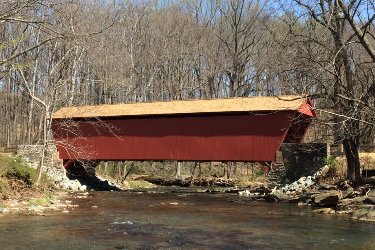Jerusalem Mill History
 In 1769, millwright Isaiah Linton and miller David Lee, both Quakers from Bucks County, Pennsylvania, entered into a partnership to build a gristmill, one of 18 mills constructed by Linton. A low-lying site along the Little Gunpowder Falls called “Jerusalem” was selected as a mill seat. After completing the mill’s construction in August of 1772, David Lee began milling flour under the "White Silk" label. Much of the gristmill’s flour was shipped to the Caribbean.
In 1769, millwright Isaiah Linton and miller David Lee, both Quakers from Bucks County, Pennsylvania, entered into a partnership to build a gristmill, one of 18 mills constructed by Linton. A low-lying site along the Little Gunpowder Falls called “Jerusalem” was selected as a mill seat. After completing the mill’s construction in August of 1772, David Lee began milling flour under the "White Silk" label. Much of the gristmill’s flour was shipped to the Caribbean.
Originally known as Lee's Merchant Mill, Jerusalem Mill was one of the important early mills in Harford County, and one of the largest in Maryland. It saw great changes in technology and economy through its two centuries of operation. The half-mile long race channeled water into the mill and powered two internal pitch-back waterwheels. These were later replaced by two horizontal water turbines, which turned vertical shafts driving the machinery above. The ground floor served as the grinding level with 52-inch millstones. The 5-story, 60 by 30-foot mill building was framed using classic millwrighting techniques, featuring massive white oak posts supporting the oak ceiling, floors and stairways. Two tiers of three dormers on each side of the roof provided light to the upper levels of the building and contribute to its distinctive look. The mill was converted to electricity after a flood broke the dam in 1940.
The business evolved from Lee’s original merchant milling operation to a combination of services for the local farming community. The mill outlasted most of its competitors due to the entrepreneurial spirit of the last miller, Jack Bridges. Recognizing the declining business in milling, he layered on an early convenience store and the revenue from this sideline compensated for the decrease in milling income until his death in 1961.
Village History
The surrounding village was also the site of a cooperage, blacksmith shop, wheelwright, sawmill, general store with post office and the Jericho covered bridge.
The cooperage was referred to as the “gun shop” for its alleged use during the American Revolutionary War for the production of gunstocks for the Maryland Militia. In later years the building housed at different times a cabinetmaker's shop, a cider press, a cannery and a residence. Today, the building is referred to as the Millers House and is used for living history demonstrations including hearth cooking and gunsmithing.
The McCourtney's General Store had its moment during the Civil War when a band of Confederate Cavalry under the command of Colonel Harry W. Gilmor swooped down and "requisitioned" nearly $1,000 worth of goods and horses.
Down Jericho Road from the store is one of Maryland’s six remaining covered bridges, constructed just after the Civil War in 1865.